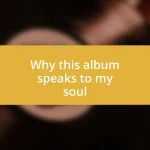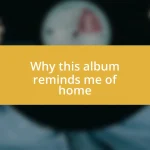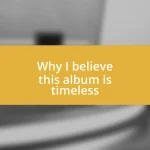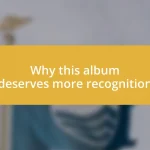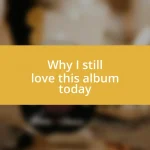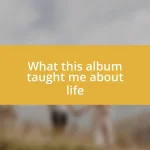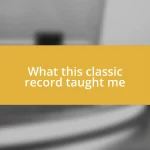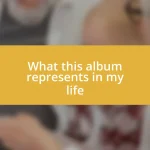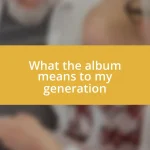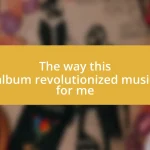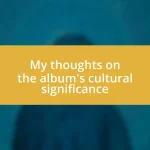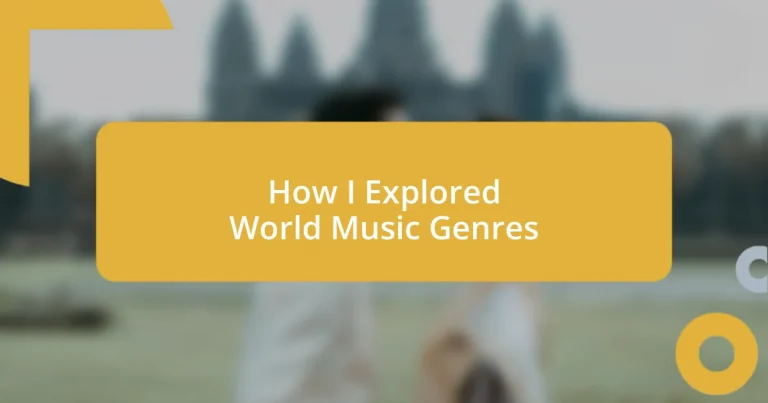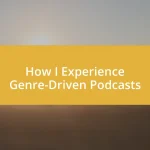Key takeaways:
- World music genres serve as cultural narratives, reflecting the socio-political histories and emotional landscapes of different communities.
- Engagement techniques like themed playlists, live performances, and cross-art exploration enhance the depth of music appreciation.
- Connecting with global music communities through online platforms and local associations fosters shared experiences and enriches understanding of diverse musical traditions.
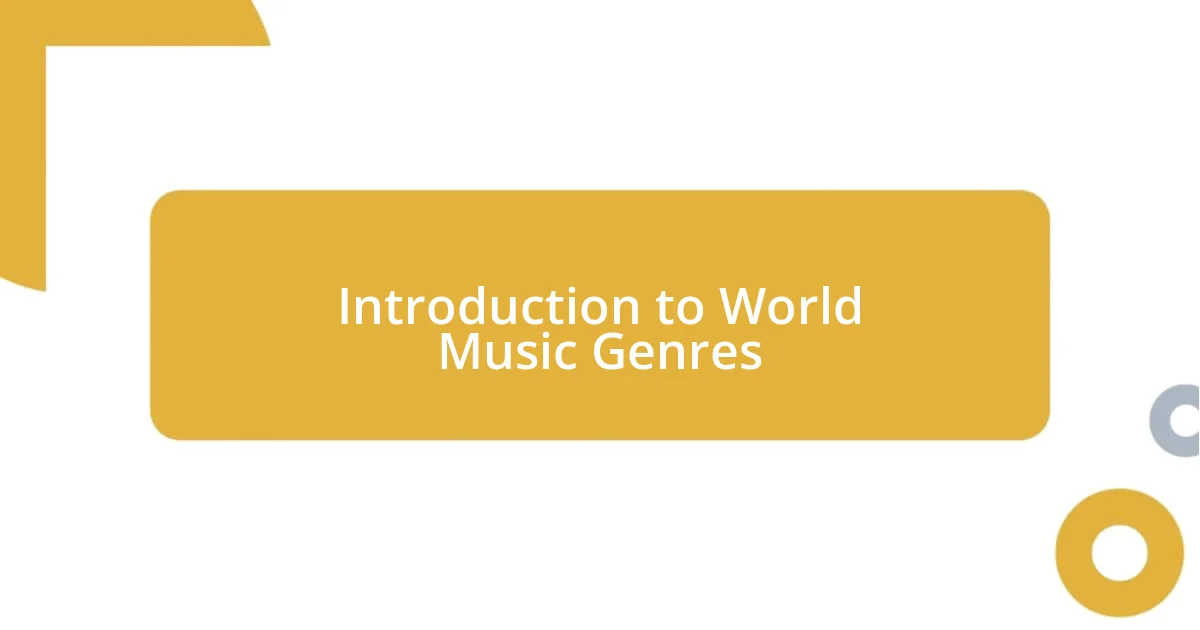
Introduction to World Music Genres
World music genres encompass a vast and fascinating landscape, reflecting the unique cultural and historical narratives from around the globe. I remember the first time I discovered the rich rhythms of Afrobeat; it was like stepping into a vibrant tapestry of sound and story. Have you ever considered how music evolves to express the essence of a people’s experience?
Each genre carries its own heartbeat, whether it’s the intricate melodies of Indian classical music or the soulful strumming of a Brazilian bossa nova guitar. It struck me how these sounds can evoke such deep emotions, transporting listeners to different times and places. This personal connection to the music encourages us to explore beyond our familiar soundscapes.
Journeying through world music genres opens us to a treasure trove of diverse traditions and artistic expressions. As I immersed myself in different styles, I found that music serves not only as entertainment but also as a powerful means of communication and connection. What genres resonate with you, and how do they reflect your emotions and experiences?
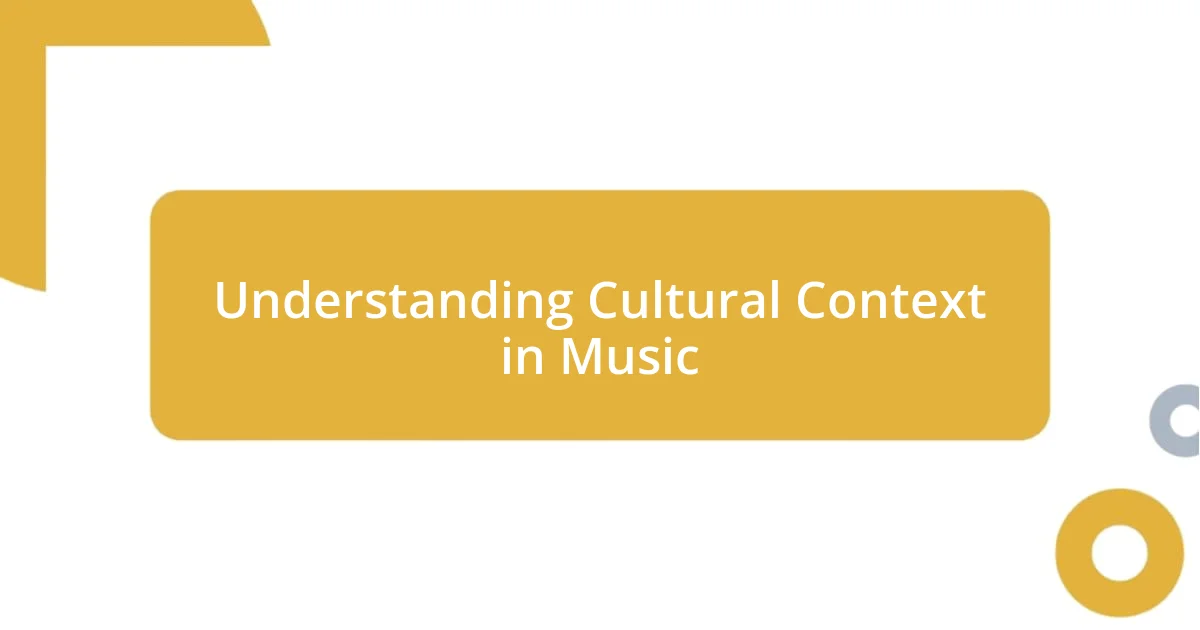
Understanding Cultural Context in Music
Understanding cultural context in music is essential for grasping the deeper meanings behind the sounds. I vividly recall a time when I attended a traditional Irish music festival. The way musicians shared stories through their instruments struck me—the jigs and reels were not just melodies; they were stories of ancestral struggles and celebrations. It made me realize how music acts as a time capsule, holding the essence of collective memory.
The nuances of each genre are often rooted in the socio-political landscape of the culture it comes from. For instance, when I listened to reggae, I could feel the powerful narratives surrounding justice and resilience. It’s fascinating how music intertwines with daily life, reflecting hopes, challenges, and the vibrant spirit of a community. Have you ever felt that connection to a song that spoke directly to the struggles of a culture?
To appreciate world music fully, it’s crucial to explore its historical and social backgrounds. I remember diving into the sounds of African tribal music; each beat seemed to echo the heartbeat of the earth, drawing me into the rituals and traditions embedded in them. Understanding these contexts enriches our listening experience, allowing us to feel the pulse of the culture behind the music.
| Music Genre | Cultural Context |
|---|---|
| Afrobeat | Reflects the struggles and resilience of African identity and political commentary. |
| Irish Folk | Captures the stories and traditions of Irish heritage, encompassing joy and sorrow. |
| Reggae | Expresses themes of peace, justice, and social change, rooted in Jamaican history. |
| Indian Classical | Embodies spiritual and philosophical ideologies, often linked to rituals and celebrations. |
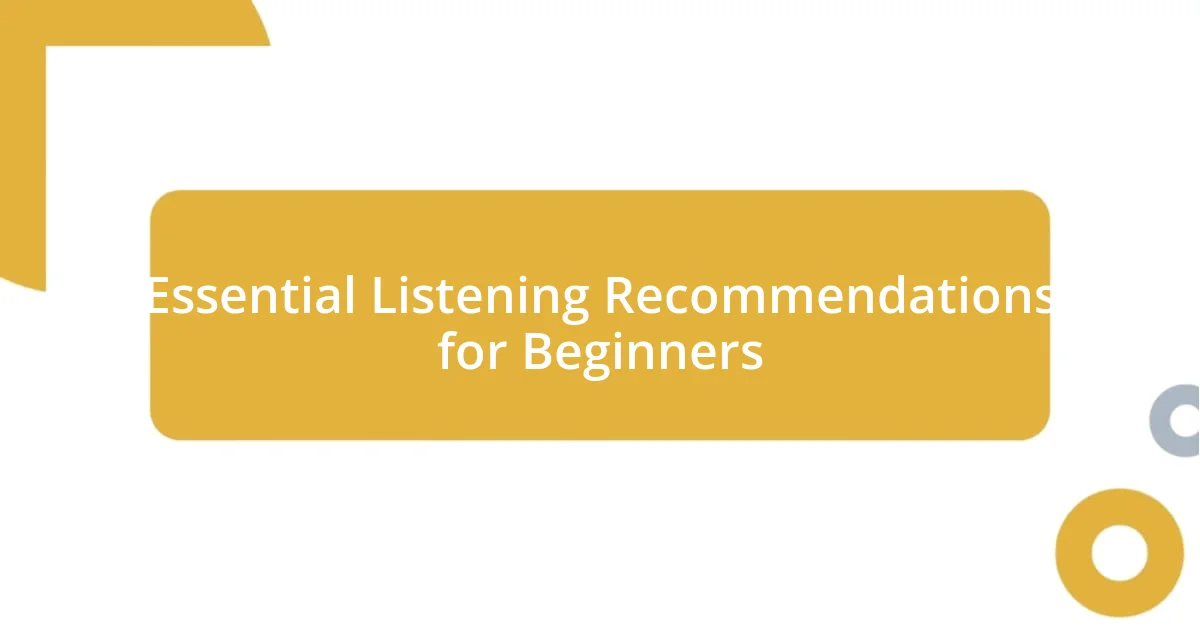
Essential Listening Recommendations for Beginners
I find that discovering new music genres is like entering a delightful treasure hunt. For beginners, it can feel overwhelming, but having a solid starting point makes all the difference. Here are some essential listening recommendations that have personally enriched my journey in world music:
- Afrobeat: Dive into Fela Kuti’s “Water No Get Enemy” for invigorating rhythms that pulse with social commentary.
- Bossa Nova: João Gilberto’s “Desafinado” is a gentle introduction, blending soft melodies with a sunlit ambiance that feels like a warm embrace.
- Indian Classical: Listening to Ravi Shankar’s “Raga Jog” introduces the complexities of improvisation; each listen reveals new layers that resonate deeply.
- Celtic Music: Give a spin to “The Butterfly” by Altan; it’s an uplifting reel that always puts a smile on my face.
- Reggae: Bob Marley’s “Three Little Birds” radiates positivity and is perfect for understanding reggae’s heartwarming essence.
As I embarked on exploring these genres, I remember dancing alone in my living room to Buena Vista Social Club’s “Chan Chan.” The music transported me to the vibrant streets of Havana, and it dawned on me how each note carried with it a slice of culture that transcended geographical barriers. Engaging with these sounds not only broadened my musical palette but also deepened my appreciation for the rich stories they tell.
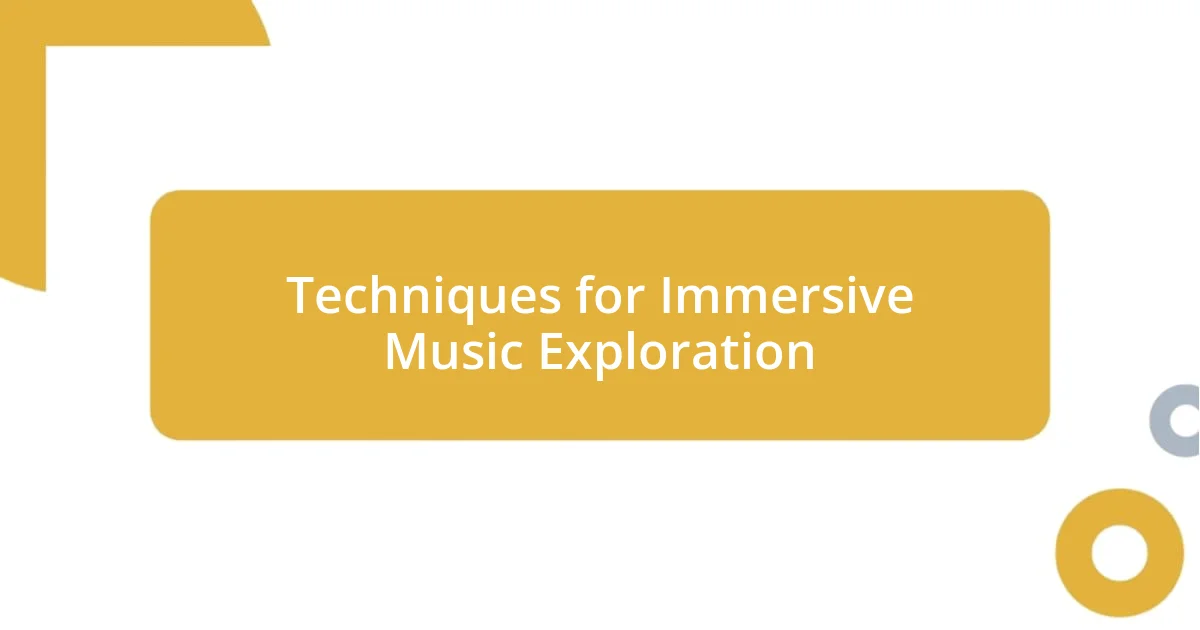
Techniques for Immersive Music Exploration
One of the most effective techniques for immersive music exploration is to create themed playlists that reflect specific cultural narratives. I remember curating a playlist for a dinner party dedicated to Afro-Caribbean music. As the rhythms of Soca filled the room, I watched my friends’ faces light up, discovering how the music inspired movement and connection. Have you ever noticed how certain songs can instantly transport you to another world?
Engaging with local musicians through live performances can also deepen your appreciation for different genres. I once attended a small folk music gathering where I sat just a few feet from the performers. The energy in that intimate setting was palpable, and hearing stories behind the songs added layers of meaning I had never grasped from recordings alone. It made me consider how each performance is a unique dialogue between the artist and the audience.
Another powerful technique is to explore music through visual art or literature from the same culture. I vividly recall that while listening to Indian Classical music, I also read poems by Rumi, whose themes mirrored the emotional landscapes of the compositions. This overlap in artistic expressions enriched my listening experience, revealing a kaleidoscope of connections between sound, words, and the broader cultural tapestry. What are some other forms of art you think could enhance your music explorations?
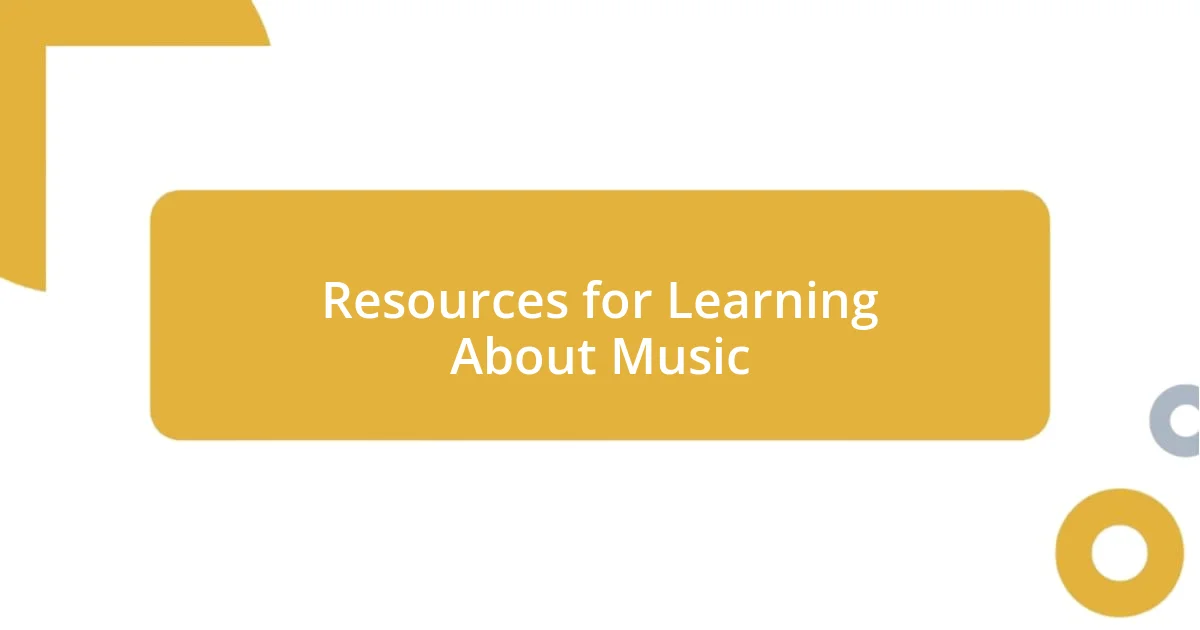
Resources for Learning About Music
When it comes to finding resources for learning about music, I can’t recommend exploring online platforms enough. Websites like Spotify and YouTube are treasure troves of playlists, documentaries, and music videos that can immerse you in different cultures and genres. I often find myself getting lost in the wide variety of world music channels, where one click can lead me to an artist I’ve never heard of before. Have you ever stumbled upon a song that just resonated with you on a deeper level? For me, it happens more often than I’d like to admit!
Books and documentaries also play a significant role in enriching my understanding of music. I recall reading “How Music Works” by David Byrne, which not only delves into the mechanics of music but also shares fascinating stories about what makes different genres unique. For those who prefer visual learning, I highly recommend checking out Ken Burns’ series on American music; it offers incredible insights into the cultural significance of different styles. How much can history influence our perception of music? I’ve found that understanding the background often deepens my appreciation for the sounds.
Engaging in social media communities is another fantastic way to learn about music. Platforms like Facebook and Reddit have groups dedicated to virtually every genre imaginable. I remember joining a group focused on African drumming, where members shared both personal experiences and educational resources. It became a conversation where we not only exchanged tips but also celebrated each other’s musical journeys. What a joy it is to connect with fellow enthusiasts who share the same passion!
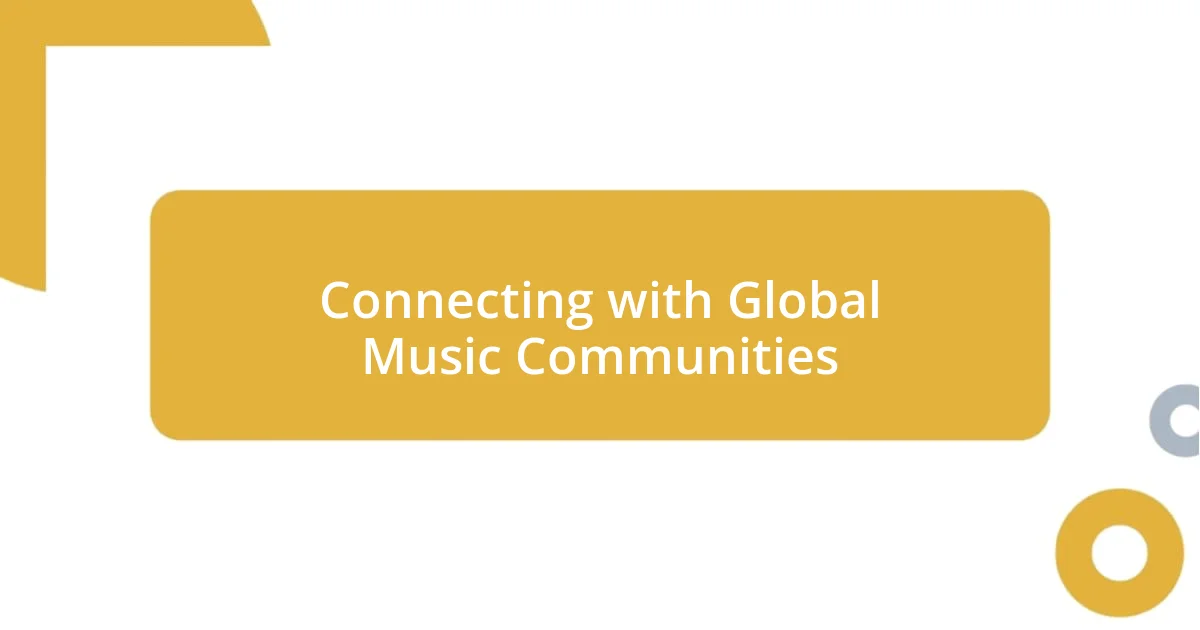
Connecting with Global Music Communities
Being part of global music communities has been an eye-opening experience for me. I remember attending an online world music festival where artists from various countries performed live. The chat feature was active, creating a virtual camaraderie as we shared our thoughts amidst the beats. It felt like connecting with friends from across the globe, united by the rhythm of music. Have you ever felt that electric buzz when music crosses borders and brings people together?
Joining local cultural associations can also enhance this connection to world music. I once volunteered at a cultural fair showcasing traditional dance and music from different parts of Asia. Immersing myself in the preparations, I learned not only about the music itself but the histories and traditions behind each piece. It sparked such a deep appreciation for how music is an integral part of cultural identity. Do you ever wish to dive deeper into understanding the stories that give life to the songs you love?
Finally, I’ve found that sharing music experiences with friends amplifies the joy of exploration. A few years ago, I hosted a global music night where we each brought tracks from our favorite genres. Listening to reggae alongside Persian pop opened up avenues for discussions about cultural influences. It was amazing to see how different sounds sparked conversations that transcended mere listening. How do you think sharing music can deepen relationships and broaden our horizons? For me, it transforms music from a solitary experience into a shared journey of discovery.
